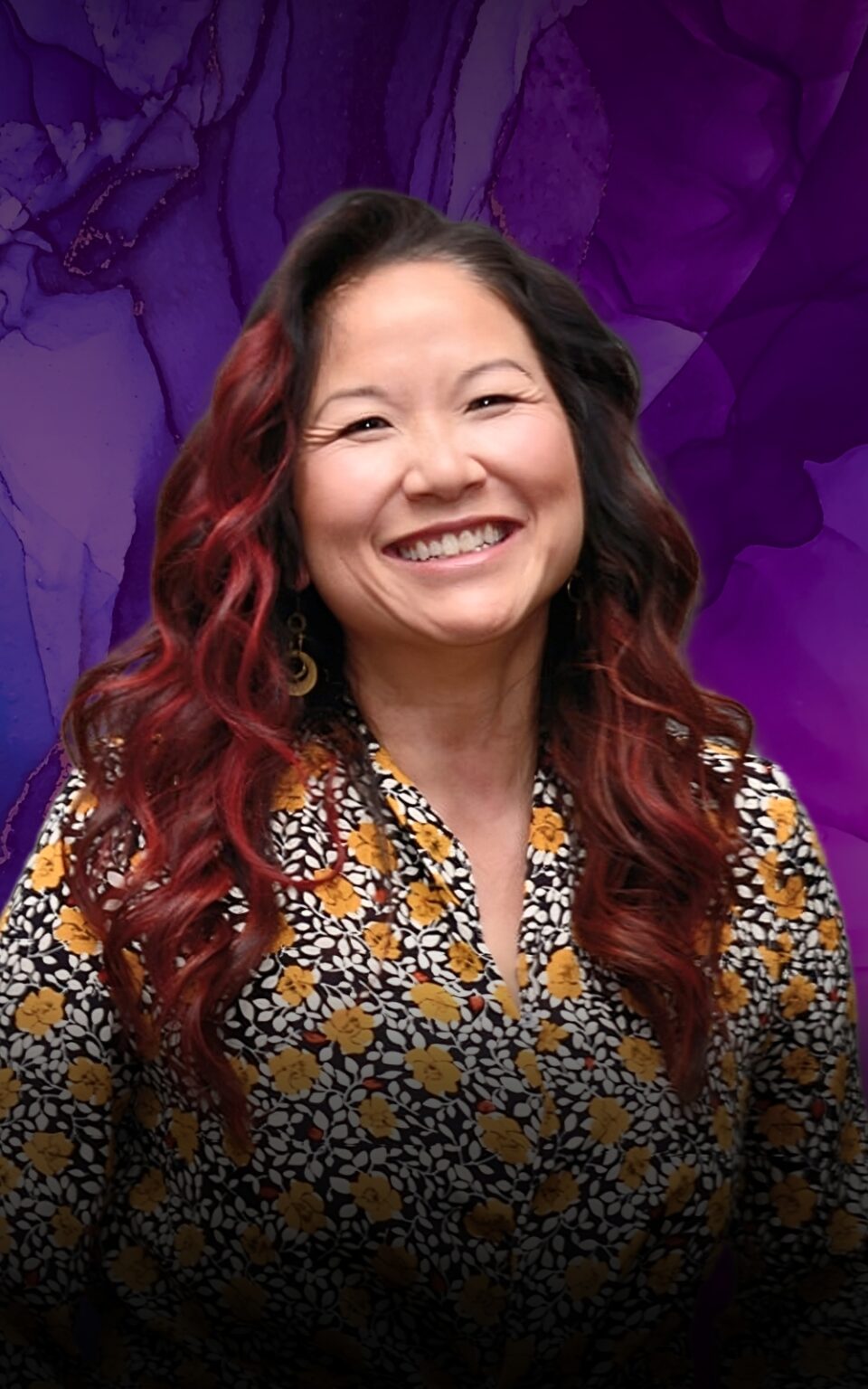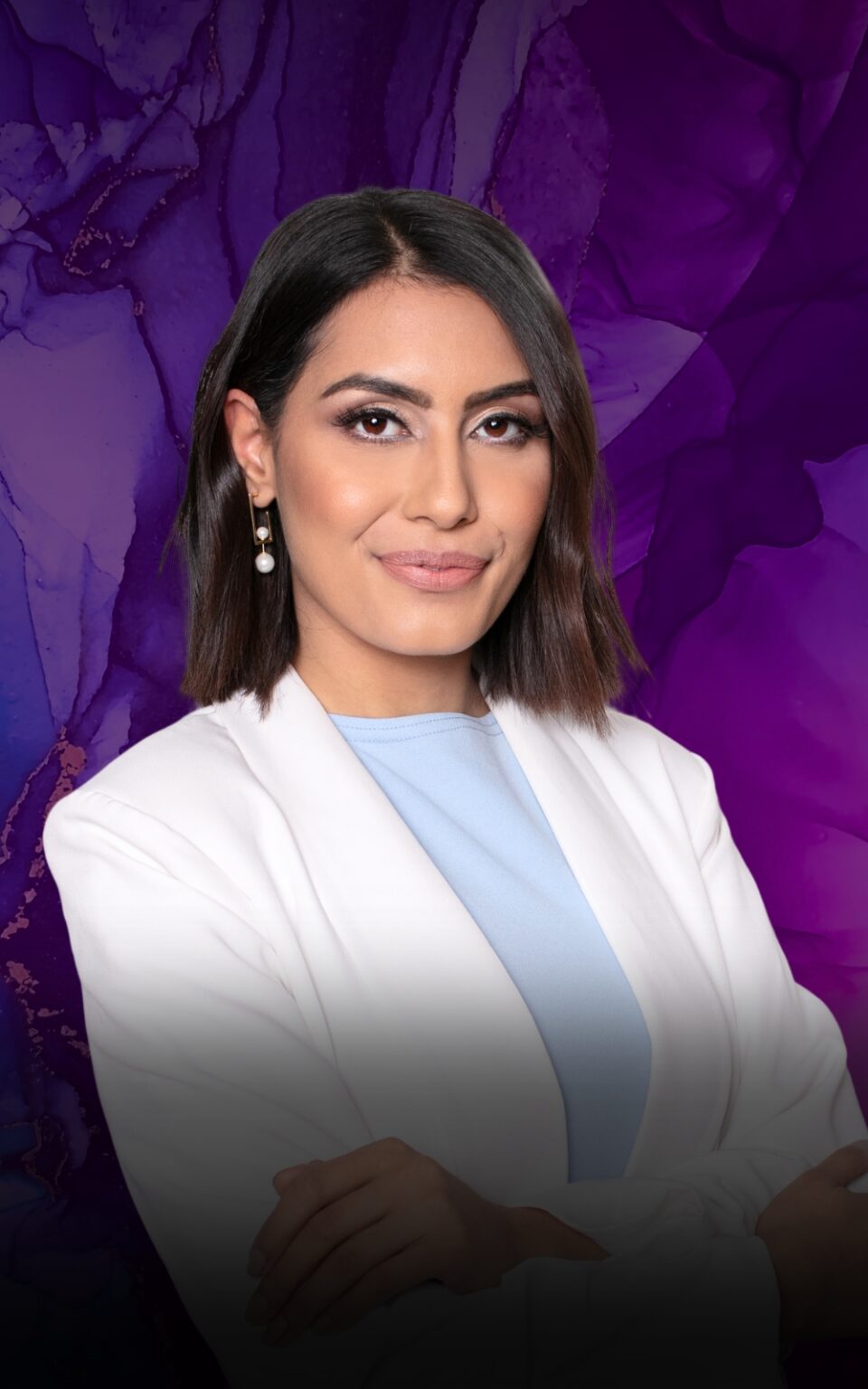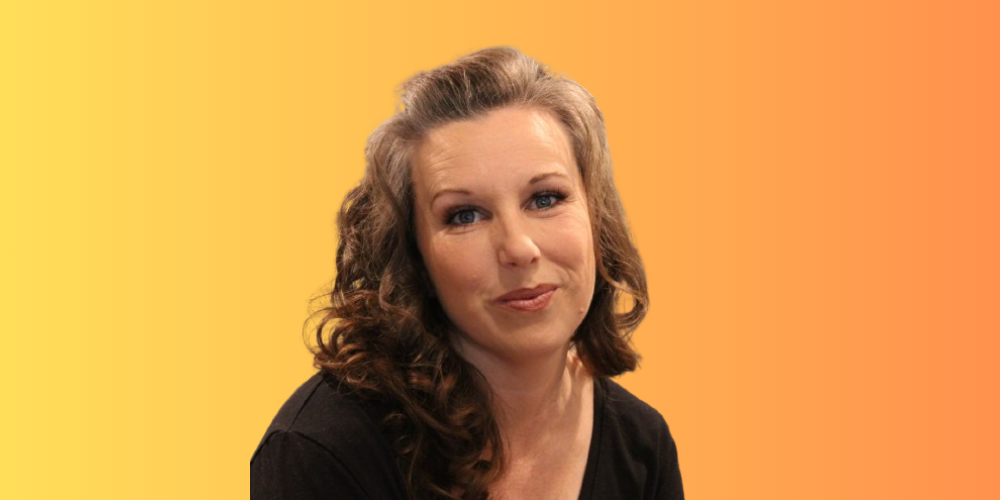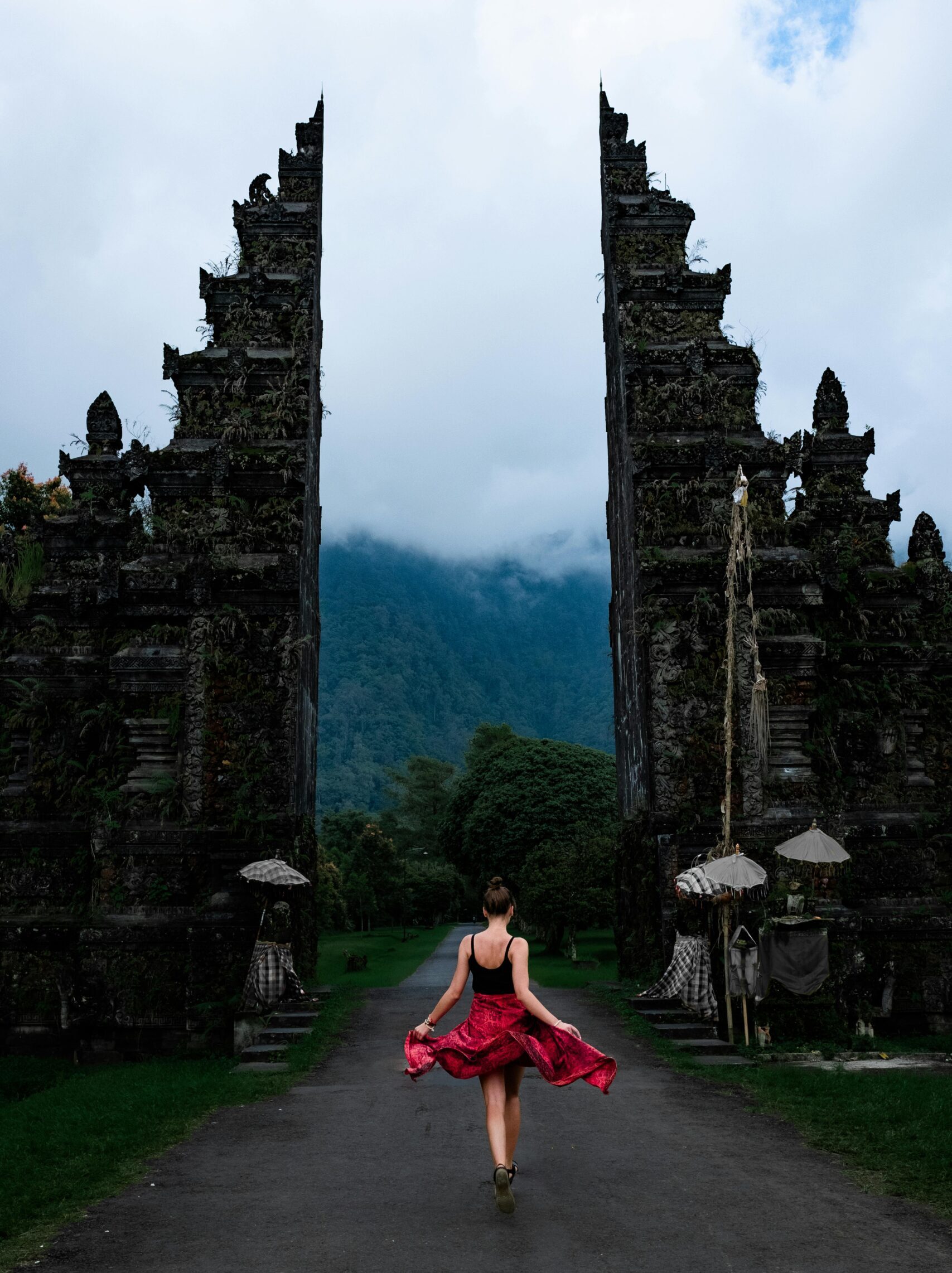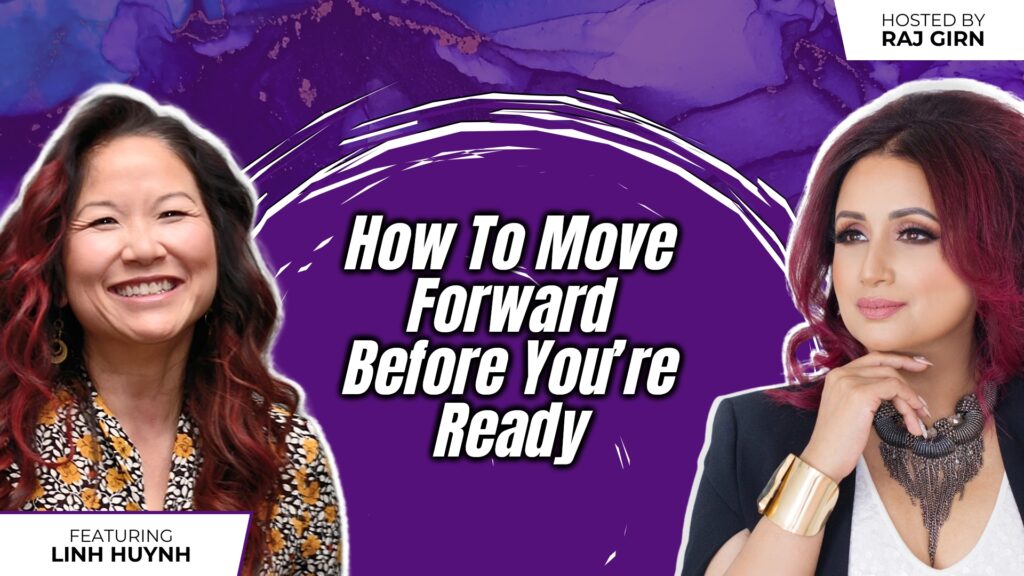
Raj Girn: Hi everyone! Welcome to another exciting episode of the ‘Transform Your Confidence’ podcast, a place where we bring you into our inner circle of recommended leaders, experts, and thought leaders to garner their insights of knowledge and techniques that are working today with the goal of levelling up your repertoire of expertise so that you’re always set up to win.We love winning here, don’t we?
In today’s show, we will be focusing on Mindset & Accountability with the theme of How to Move Forward Before You’re Ready?
TO WATCH:
TO LISTEN:
TO READ, SCROLL DOWN:
Raj Girn: I’d like to begin by first of all, inviting you to subscribe to our YouTube channel at The Open Chest Confidence Academy to view all video versions of the show and also search Transform Your Confidence wherever you receive your audio podcasts, so you never miss an episode, when we launch them every 2nd and 4th Thursday of the month. Please remember that and hit the notification button just in case you don’t remember.
In today’s show, we will be focusing on Mindset & Accountability with the theme of How to Move Forward Before You’re Ready? Hmm, that’s just a whole massive conversation.
My guest today is the incredible Linh Huynh, who is an extreme athlete, professional speaker and educator who inspires audiences to embrace curiosity, reframe fear, and pushed beyond perceived limits. A refugee who navigated the unknown from an early age, Lynn has since built a life defined by audacity and adventure.
She is one of the few women in history to complete the 4 Deserts Ultramarathon Series within a calendar year no less. Conquering some of the most extreme landscapes on earth, having also raced in both the Antarctica and the North Pole Marathons. Oh my God, what a woman!
Please welcome to the show a woman who knows a thing or two about how to move forward before you’re ready. Welcome to the show, Linh, and thanks so much for agreeing to come on and talk about your unparalleled journey and teach us a thing or two about doing the thing that you most fear and winning at it as you have. Thank you for coming on, sweetheart.
Linh Huynh: Thank you for the great intro that makes me sound great, and every time and when I hear people delivering intros about myself I think I’m tired just listening to that.

Oh my God, trust me, no one watching, listening, or reading this is going to be tired of your story, my dear. So, Linh I want to begin by asking you, what was it that brought you as a refugee to Canada? Can we start there?
I think instead of going one step back we have to go two steps back. So my name is Vietnamese, when you look at it it’s a Vietnamese spelling of my name but we’re actually ethnically Chinese and my father and my mom were – left China to escape the Chinese Civil War thinking that oh we arrived in Vietnam and now we’re at safety, but the irony of it is that they arrived in 1955 and that’s when the beginning of the 20-year conflict.
My mom is an incredible woman. She was 19 when she had her first son. So funny side note – and a happy side note, we’re all still alive. My mom had kids, we just celebrated her 89th birthday. My dad was celebrating his 92nd birthday this summer. But it also means that I have a brother who’s 70.
Well, time doesn’t wait for any of us, right, Linh?
No, not at all. So, she had eight kids during the Vietnam Civil War.
What a great way for traveling through a war. Let’s have the kids.
Yeah, because it’s not hard enough. It keeps your mind off of all the killing. The war ended in 75. I was born in 74, and the communists took over, and it was really not safe to be there. So around the late 70s is when globally countries recognized that the Southeast Asians needed help, there was a huge exodus of Vietnamese and Cambodians and Laotians.
We were so lucky in every regard. We were lucky that our little boat, that crammed with three to 400 people – shoulder to shoulder – we were lucky that it didn’t capsize. We’re lucky that we weren’t boarded by pirates. We were lucky that nobody in my family of 10 died of illness or starvation or disease, or the young girls weren’t kidnapped to be sold as sex slaves.
So that in itself, and that’s why across all my social media, I call myself the luck pusher because just at every turn in my life, there was just an incredible fortune.
Across all my social media, I call myself the 'luck pusher' beacuse just at every turn in my life, there was just an incredible fortune!
~ Linh Huynh
We were at the refugee camp for about a year and the UNHCR, the governing body of the UN to help with refugees, said “Good news, you’ve been sponsored by a church in Brooks, Alberta”. So that’s how it started, we arrived in Edmonton in January of 1980. This story is so funny to me because imagine what we would have been we were in a refugee camp on an island in Indonesia and then arrive in January in Edmonton.
Freezing cold.
We were immediately given warm clothing and boots and everything that we needed. And then we boarded a Greyhound. There’s, and there’s no longer Greyhounds, right?
Right, right.
What a snapshot of history. We boarded this bus and went down to Brooks, Alberta. It was a five-hour drive. And that’s where we settled from 1980 onward. And that’s how I arrived in Canada. It’s an extraordinary story in itself as I’m writing my memoir, like the actual, the history of my family holds as much importance in my mind as all of the running that you just described. And it’s what shaped me into – as we mentioned – someone who can look uncertainty in the eye and maintain that positive mindset, and just keep soldiering on when things are so incredibly harrowing.
It’s interesting because, connecting what you went through in your younger years to a lot of the things that you’ve accomplished that aren’t everyday normal feats. What do you feel that you learned or you garnered from those early years coming into the country and then, just assimilating into the country that you feel has given you the strength to be fearless?
I think first and foremost, it’s just the immense gratitude of arriving in safety and comfort. I don’t know when your earliest memory was, but I have zero recollection of the refugee camp, which in my mother’s words is probably a good thing. Don’t search for those memories, she said. Just leave them hidden.
When you’re a kid growing up in Southern Alberta and you get to go to school and you get to pack a brown bag lunch, even though I complained that sometimes the sandwiches are the same as yesterday’s sandwiches. And you complain about too much homework and you complain about not enough time for your friends. All those things are just so small.
Immediately as I’m growing up, I think, I have been given this extraordinary opportunity to build an incredible life for myself. And my father pulled me aside when I was a kid and said, just remember that by the time you were five years old, you had already done the hardest thing you would do in life – survived a war and a refugee camp. So he’s like, your start line is light years ahead of your siblings, and what you do with your life, where you decide to place your finish line, that’s on you.
That just really hit me hard because all those little mundane things – brown bag lunches – my siblings didn’t get to attend school. Six people older than me didn’t, because how do you go to school in the middle of a war, and more importantly, how do you go to school in the middle of a war, in a war-torn country?

My mom tells a story of how my oldest brother, the 70-year-old, he had two years of schooling. And she was really proud about that because that’s all she could afford. And after that, she couldn’t afford much else for anyone else. And so for your question, it’s just about the wise words of my dad. So, you have been given this amazing start line. Your start line is here. So where do you want to place your finish line?
That’s profound.
Yeah, and I talk about that in my keynotes and stuff. I looked at the audience, and I said, did you know that according to the World Bank, well, I’ll ask you, what family income do you think you need to be better than 99% of the world globally? Raj, how much for a family income?
You need to tell me. I have no idea. I haven’t even thought about it. But I’m intrigued now.
Yeah, and not better than Canada or the US. I mean, we’re in the upper echelon already, but to be better than 99% of the world globally, you only need a family income – not individual income – family income of $50,000.
That is nothing.
Yeah, I think it’s safe to say that.
Right? For us?
Oh, so family income. If you have a mother and a father working – so we went from, you’re already gone from a war torn third world country, get on a plane, it’s like winning a lottery. On a plane you arrive in Edmonton you’re given warm clothes. Our sponsors for the private sponsorship program at the time and still now actually. You have to guarantee that you’ll pay for, you’ll cover the living expenses of your sponsor lease for an entire year.
So we arrive in Brooks – our rent, our utilities, everything – everything is paid for it. We were driven around to all our medical checkups and appointments, they helped my mom find a job, cleaning rooms at a hotel. So when you go from the one bottom, bottom 1%, and you get on a plane and you end up at the top one percent.
Are you telling me – how can you be there and how can you set small goals? Like you are not honouring the sacrifice of everything that the people who were here, my brother, his goal might have been one more year of junior high school and the two years that he did in, we were like grade six and grade seven when he was like 10 or 11.
You know, I’m listening to this part of your story and I feel like the next question that I wanted to ask you is, it’s been, you’ve already answered it, but I want to encapsulate it, so people actually truly understand that everything we go through in life truly is a relative experience, right?
Before we go into the feats that you’ve accomplished, sister, I want ask you this, just to set things in place for people that haven’t had the kind of experience that you’ve had that journey, that massive leap of a journey that you had, which I feel has set your mindset from the get-go at a very early age so that the things that we look at what you’ve done being huge feats, perhaps in your mind, like your father said, you’ve already done the hardest thing, right?
So let me ask you this, was pushing past – is pushing past what people perceive to be outrageous feats, is it because of what you just talked about here? Or did you build upon that and learn other things that helped you do these audacious things that you’ve done that we’re going to talk about next?
I’d say half and half. So immediately it was like half of it was the refugee background, the struggle, the constant like being at the dinner table and hearing stories of how my brother was thrown into a communist prison because he tried to escape the country and his escape plan was to smuggle himself on a boat, make it to Australia, somehow, find our relatives and work hard enough to sponsor us all over.
So when you’re at the dinner table and you’re like, wait a minute, like Kendrick Lamar said, it’s in my DNA, so you get to look at these titans of life and just think, but we grew up under the same roof, we came from the same womb, and so it’s you and for my parents, they produced me. So, I’m like a Xerox version of them, right?
I love that analogy.
If I am them, if their greatness was surviving a war with eight children, what is my greatness? Then I had that as my starting block, my template, I’m like, okay, this is no insult to teachers. I think teaching is such a noble profession, I’ve been doing it for close to 20 years. No insult to teachers, but was this my legacy? Like going to work, teaching, transforming lives, yes, but what else?
And I don’t have kids, so I don’t have that, but wondering when I look at my mom and how we’ve just celebrated her 89th birthday, my dad will be 92. When I am at their age and when I’m sitting around and I don’t have the eight children to gather around and look at what I’ve accomplished, so what would be my legacy?
Would it be like a wall of student photos of lives that I’ve changed?
Which is a big deal.
It’s a huge deal. And I’m not undermining that at all, but always coming back to my father saying, I have fulfilled my role as your father and I have brought you to Canada, to safety and to comfort, you’re the top 1%, so what you do with your life is up to you.
And there was, through all those feats and through all the struggles of crossing a desert, like 250 kilometres through a desert self-supported, it was, but it always hearkens back to that. He said, you cannot set the same goals as your siblings did. And my siblings have stable careers and are married and have children. I have 10 nieces and nephews.
This is great! Right, they got that life that they would never have had.
Exactly. I’m so glad you said that because then I also got the life that I have and my father is just so full of pure wisdom and love and I always say, I wonder what would have happened if we had stayed in Vietnam. I would not have gotten to be the Linh Huynh that I am.
We wouldn’t be sitting here having this conversation.
I wish there was time for me to hear your story. I’m sure it’s incredible. Okay, I am coming to Toronto and we are going to do dosa.
We’re going to do a dosa and I’m going to tell you my story. You’re going love it. But today, my darling Linh is all about you. And I want to ask you this. Everything that I’m listening to here, it’s almost like, I hate this word, but it’s the only word that’s coming to me right now. It qualifies you for doing the impossible that you have done, right? I want to know why extreme sports? Why was that the thing for you? Before we talk about some of these accomplishments in that realm? Why that? You could have done anything.
Extreme sports are actually such an unexplored field and when you are the seventh of eight children, you don’t get to experience being first at something.
Extreme sports are actually such an unexplored field and when you are the seventh of the eight children, you don't get to experience being first at something.
~ Linh Huynh
I love that.
Yeah. And I think what you’ve done, which is build a business empire and dabbled in so many different fields, takes a lot more courage and know-how and confidence than what I’ve done.
I beg to differ but carry on.
We will argue over a dosa. For me, it was about putting one step forward. One foot in front of the other. And that no Canadian woman had completed a marathon at the North and the South Pole. So, when you hear that kind of statistic, I’m like, this is my childless legacy, like this is the thing.
Want to use it to inspire my friends and my family and my students and my nieces and nephews and this is the thing that I wanted to look back at life, and be like, I did something extraordinary. And then when I heard that no Canadian woman had finished the Four Deserts series, I had to go full tilt because it’s called the Four deserts. It’s not the Three Deserts.
So, I mean, in the same way, like you don’t get a bachelor’s degree for finishing three years, right? And that was for a lot of people, they just said like, why do you have to, why do you have to go from zero to four? I’m like, well, why did you finish your bachelor’s degree?
Same thing. It’s all or nothing, it’s all and nothing. You do it all or you get nothing.
Yeah, or you could have gone to community college for two years. Why start at university? So, it wasn’t all or nothing like that. When I finished Antarctica, the marathon and then the North Pole Marathon, my joke is that I finished the South Pole and the North Pole, so I became Canada’s first bipolar runner. And that was just the beginning of testing my limits,
Antarctica was hard, but I live in Calgary. Antarctica was minus 25. Two weeks ago, it was minus 40 here. And then I was at the finish line of the North Pole and this other run, and I, you know, I jokingly said, oh, that was reasonable. And he was from Lebanon, and he said, what are you talking about? If you thought that was reasonable, have you heard of the Four Deserts?
And that’s when the wheels started turning and just all the little parts of the gears that had to connect perfectly, like financially, physically, timeline-wise. And I just, as you mentioned, it was a calendar year. So, there have been other runners since, because this is about 10 years ago, but there have been runners who’ve completed it but the runners that I encountered were like I’ll do it every two years, just take a break from it, because it’s hard on your body. But I was like, no, I’m not going to prolong the pain. Nobody wants to prolong the paint of labour. They’re just like, get this thing out of my body.
I’m like, I don’t want to suffer for a week, one year, and then wait another two years to suffer again. So, I just went all in and I set that timeline. I was like nope, all four, one-year, Grand Slam, eighth woman in history, first Canadian woman and that was it.
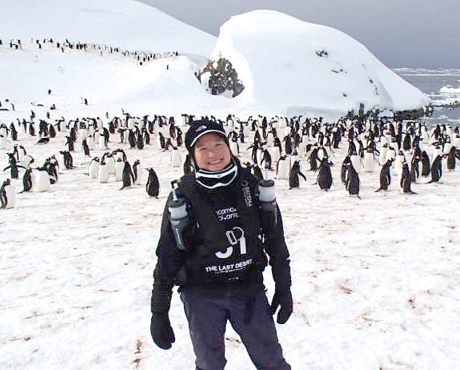
Wow. I have to ask you this because as I’m listening to you, you’re saying it so effortlessly like it’s such an effortless feat, even though hardly no one’s done it in the world that’s a woman. How does one mentally prepare to push themselves, especially their body and prepare their body.
And then when you’re in it and there’s moments, because we flow as humans, right? There are moments when there’s the lows and then there’s the ups and then the lows, and the ups. Did all that happen for you? Did you have the lows in the ups?
Or did you prepare yourself mentally to be as strong and as fierce as you could be physically, and then just not look back and keep going forward? Like, I’m curious to know what that was that kept you doing it when you were in it.
Yeah, so you said, did you have the lows and ups? And I was laughing because like, yeah, I had the lows and ups like every minute, like one minute I’d be like, it’s beautiful out here. I’ve never been in this; I’ve ever been in a desert in Jordan. I’m like, I don’t get this stunning scenery. And then just like, oh my God, I’m so hot and tired my feet are killing me. Can you walk to the end of your block? Would you struggle to walk through the end of your block? And then after that, could you walk to the end of the next block?
I love walking. I just keep going. And I don’t think . . .
Oh, then you could do these, no problem. In my keynote, I call myself an extreme non-athlete because here I am a walker, an extreme, non- athlete, like a walker up against runners. And I was a tortoise, and it didn’t matter.
So, I ask people, can you walk to the end of your block? Yeah, no, problem. I mean, unless you have mobility issues, right? Okay, so at the end of that block, like what if I had told you to walk to the end to the next block. At what point in your brain or your body do you think you couldn’t walk another block? And that’s how I broke down the chunks.
I speak a lot about uncertainty because in my audiences, I find that a lot of people are like, well, I just don’t know where to start or I don’t know how it will end and my view on that is but we never know how it’s going to end.
On your first day of university, did you know how your academic journey would unfold? When you’re standing at the altar, do you know exactly how your marriage is going to pan out? But the best example, and I ask who has children, and let me guess, before you had children, you had their room set up. And there are RESPs in place, and you had a plan, and you had a nursing plan, and you had a care plan and you were all ready and everything was going to be certain.
And they laughed because our lives are so uncertain. So, like at the star line of every desert race I have a vague idea. I know the temperature range. I know that sand is way harder to run on than asphalt. There is always a level of uncertainty and there’s always this, and yet we still have an incredible discomfort around uncertainty. I don’t want to start this business because I don’t know how it’s going to go.
I took the first step on day one of a seven-day race, not knowing that on day four, we would have six river crossings and I’m five foot two. So, they’re like, oh, it’s knee deep. I’m like knee deep for you. Not knee deep for me and so you can be as prepared as you can be as compared as you can’t be like me.
There was an incredible equipment list that outlined exactly why we needed to bring their checkpoints where there was medical help and there was water at every 10-kilometer aid station. But it doesn’t prepare you for the wild dogs. It doesn’t prepare you for the locals who have – local children who, as a lark, have decided to take the flags – the little like one foot neon pink flags that guided us.
And I’m like, where’s the pink flag? And they would stand there and laugh. Like it doesn’t prepare you for sleeping in a tent with 10 other people and you all smell because you haven’t showered in a week. One of you is a really loud snorer. So, there’s, I guess that’s my greatest message is that you can prepare mentally, you can prepare physically, you can prepare for all of the things, but the path will not reveal itself until you’re actually on the path.
My greatest message is that you can prepare mentally, you can prepare physically, you can prepare for all of the things, but the path will not reveal itself until you're actually on the path.
~ Linh Huynh
And in my keynote, I talk a lot about penguins, but using that analogy of like, do you think the penguin can look at this body of frozen water and decide the best way to cross it by just standing on the shore?
No, like, and luckily the penguin is also a good swimmer, but it has to take that first step. And once he takes that first and once he puts that weight on the ice, then the cracks will reveal itself. How many of us started University?
I was going to be an accountant. It was a safe and easy job and it’s just numbers and I’m great at numbers, like um but how many of us started university with an idea of what we wanted to do and then changed by our second year and nobody blinks an eye and nobody’s like oh you have failed miserably as an accountant or like that penguin you’ve just shifted your path along this ice that speaks more to your heart song.
That being an accountant and now like when I think of, I cherish what I’ve been able to do in a classroom and leading adult newcomers and helping them get their language training. I feel like, I joke that I have created so many doctors, I’ve created so much nurses I’ve – you know, we’ve had doctors come from Egypt and Iran and India and China and I’ve helped them recertify in their fields and yes, you can prepare mentally, yes, you can prepare physically, but at the end of the day, your path – like the penguin and the fractured ice – your path will not reveal itself when you’re standing on the shore. It will only reveal itself when you have the courage to take that first step.
This is so in line, Linh, with the theme of today, which is How to Move Forward Before You’re Ready. You have a concept, your whole life speaks to this, but you have a concept that speaks to this called Luck Pusher. I love it. It’s such a great name. Can you share a little bit about what the ideology behind Luck Pusher is?
It came about because of the phrase, don’t push your luck. So why do we use that phrase? Some of my favourite examples are like, I think I’m going to ask my boss for a raise. We’re like, oh, don’t push your like. Or, I think, I’m going to start a new business. You know, I have two successful ones, but I’m thinking of launching a third. Oh, you’re good enough where you are. That concept of like, you’re good enough where you are. And if you venture to take another step forward, you might risk losing everything that you have. Because I had a great job, full-time job teaching at a college, and I chose to step away to become a professional speaker. A lot of people were like, why would you, like you’re trading a pension, you’re trading security, you’re trading like a tenured position to forge your own path. And I said, yes, you know, and pushing my luck when with these extreme races was a lot of it was, how I was able to finance them.
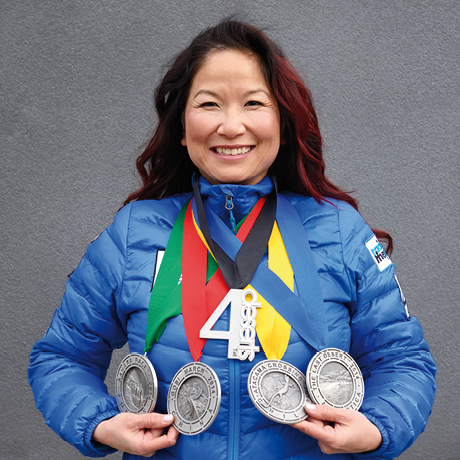
And the really creative ways of, because I had a teacher salary and I couldn’t afford, like Antarctica was $16,000. So, I used my writing skills. CBC had a contest, and they asked Canadians, what is your ultimate active adventure? And I said, I wanted to run, and I explained the reasons why. From there, I was able to win this national prize, and it was $10,000 to put towards this race.
Oh, I didn’t know that. That’s so interesting.
Oh yeah, you know, yes, I completed these feats, but the way that I funded these feats was actually where Luck Pusher came from. And so, when I finished Antarctica and I was the first Canadian woman to finish that distance, and I have to note there was another Canadian woman, but she had run a different distance. She had completed the 100 kilometres. But my friend, and then you could have just settled there.
So, luck push, like ‘don’t push your luck’ is used for people. And I don’t know why we do it. I don’t know why we encourage people to not keep pressing up against their limits. I’m just like, you’re good enough. Like you’re going to know – your two businesses is good enough, your tenured position is good. Don’t push your luck. Don’t pursue anything more. And I was the opposite. I’m like, well, if I can do that, if. You know, it’s like if I can start one business, why can’t I start another in a totally different field.
So, after Antarctica, the wheels were turning like, well, if I did this one, what else is there? Oh, there’s a North Pole. And if I do the North Pole… It’s not that I suddenly had another $16,000 till the North Pole was the same. I don’t know about you, but I don’t have $16000 of pocket change. And I said to my friends, Yeah, they said, what are you going to do now? And I’m like, well, it doesn’t end in Antarctica, the sister race is the North Pole.
The problem is that it’s $16,000. Well, that was no longer a problem when I shifted my mindset of how can I creatively access this money? And then low and behold, it was the year that Kellogg’s released their new cereal. Kellogg makes fruity cereals, like Captain Crunch and Lucky Charms, they’re all candy cereals, I call them.
Kellogg’s released a cereal called Vector and it was meant for athletes, it’s high in protein. They had a contest and said, what is your ultimate active pursuit? And I explained, well, I’ve run Antarctica and now I’d like to run the North Pole. And Raj, I won another $10,000.
Yeah, so that’s where the luck pusher came from. It’s just like, you could have been happy with one national writing contest win of $10,000. But no, you had to do it. You had to do it again. You had to go to the North Pole, which is way harder than Antarctica because there’s no land mass up there. You literally are like the penguins running on a floating sheet of ice.
Oh my gosh.
Right. So, and that’s where luck pusher comes from. You don’t have to feel complacent in the current state of things in your life. You can walk into your boss’s office and ask for what you deserve. You can be bold enough to venture into a totally new career at whatever age you are. Like my friend’s grandma who got remarried at 75. You can do whatever you want.
You don’t have to be like, did anyone tell her, no, you’re already 74, you don’t need to date anyone. It’s okay, just, which is terrible advice. What we can do for one another is I challenge you to whatever idea someone proposes, whatever idea that someone throws out at you, be their improv partner.
In improv, they have this thing where it’s called yes-and, and that’s how they keep the scene going. And when they’re doing improv, it’s like somebody presents an idea and like, oh yes, and this, yes, and this. Don’t be the yes-but person, be the yes-and person. Don’t tell the 74-year-old that it’s too late to date, it’s too late to find love and companionship, that’s ridiculous. Or don’t tell the entrepreneur or the serial entrepreneur that, don’t the, don’t, person running their construction company is like well you’ve already built 50 houses, like is that not enough? Block pushing is the concept that it’s never enough and in a good way.
You know what’s interesting about this? The reason why people say, okay, I’m good, right, I have enough, is the fear of what they may lose that they’ve already got.
Look, I’m actually writing that down because people say that, oh, no, no. I’m good. I’m good. The fear of losing what they’ve already got.
What would you say to that person?
The regret of not doing it is greater than the fear of losing. And if you lose, you don’t lose, you either win or you learn. The regret of not doing it will always be greater. No one’s going to be like, oh, I started that business and it failed. Okay, so what did you learn from it? Take it to the next one and make the next one bigger. The regret of not doing it will always be greater than the fear of losing.
The regret of not doing it will always be greater than the fear of losing.
~ Linh Huynh
Absolutely. You know, I want to connect this back to my audience, women, leadership positions, aspiring to be in leadership positions. We know that it’s a very different world for women than it is for men in similar complementary positions. There’s a deep correlation between how sports athletes prepare themselves to win and how professionals who win do. What are your thoughts around that?
There’s this interesting statistic about women in the workplace that when they see a job posting and the criteria that’s listed in the job posting, and if they have, oh, I only have seven of the 10 points that they’re looking for, I’m not going to apply. Similarly, on the flip side, a man can see that same job posting and say ‘holy cow, I have seven of these 10 job points I’m going to apply’. And I don’t know what it is about women, it’s a larger, broader problem. We can have enough and still feel inadequate.
Actually, it’s really interesting, Linh, because that’s what the premise of The Open Chest Confidence Academy is about addressing the competence versus confidence gap, and women have that.
And I’m going to add one word to what you just said, addressing the perceived lack of something. Cause how can two people, I have seven of these 10 I’m not going to apply. Oh, I have 7 of the 10 qualities they’re looking for and the experience or education, et cetera. I’m going to apply. When does that happen? How did that happen?
Nurturing, societal conditioning, right? And a workplace that originally was created and curated by men for men. So that’s what we’re looking at as women to change the dynamics so that we’re not showing up wanting to be like men to succeed, but we’re showing up being women to succeed.
And this is not a man, this is not a gender game, because this is, you know, you in my culture, in Hinduism, for example, the male and the female attributes are needed equally in order for there to be order in the universe. And that’s the balance that is missing. And it’s that balance that we need to bring back up into the game.
So, this is not about women bashing men. Not at all. This is about telling men why they need to create space for the feminine attributes that they themselves also have but that we innately have as women so that we can meet each other at a balanced and equal space. But we’re actually creating a world that is holistically created for all humans. That’s the goal.

That is the ultimate goal, everyone feels valued and emboldened to pursue what they want to pursue.
Absolutely, that’s my mission, Linh. That is my mission and I’m on it. And this is why stories like yours are so important because, here you are, you’re a woman, you are an immigrant, you are you know ethnic, hate that word, but you know these are how we define who we are, right?
All the things that should go against you in the society in which you came into, right? But you didn’t see it that way, right? You saw that you have an opportunity to do whatever you decide to do. That you gave yourself permission to be that version of you.
I know, right? My father gave me courage and perspective. He’s like, I gave you a seat at the table. What are you going to do with it?
So, let me ask you this, because the whole purpose of human existence is for us to push ourselves so that we can be a better version of ourselves, right? This is why we do the things that we do, or the reverse.
The whole purpose of human existence is for us to push ourselves so that we can be a better version of our selves.
~ Raj Girn
Some people have this ideology within their journey where they want to do all of the destructive things that they can, because they’re on a different path, but it’s actually coming from the same place. Having an intention to do something, whether it’s destructive or whether it is not destructive, it comes from the same place.
So, I want to ask you, it’s what we do with it, it’s the intention of the action that makes the big difference. I want to ask you this because we’re getting ready to close off soon and I feel like there’s just so much that we haven’t talked about.
So, let’s give everyone watching, listening and reading this a few additional nuggets of wisdom for them to be able to glean from, and perhaps see where they’re at in their life. And is it enough or is the next thing that they want to do something that they actually are going to do.
Because this is a big theme that we’ve been talking about throughout today. When does a person say no to something? Like, where have you drawn that line? Because I haven’t heard it yet.
I haven’t drawn, I mean, the obvious answer is like anything that’s unsafe to my neck, you know.
But you’ve done the unsafe things, sister.
But this is the thing is like none of it was – I will not jump out of a plane. I’m not brave like that. I don’t call myself an extreme athlete, I call myself an extreme non athlete because I came last in every single race.
But you got there, right? You got there.
Exactly, so to our listeners, and that’s a huge point of what I’ve done is when I go and I see a keynote and there’s an Olympian on the stage and he or she’s like, you can do whatever you want. I’m like, really? Could you do what you want?

Because you were born six foot two and your parents were also Olympians. Like I’m a tiny little person who dreamed big. Are you comfortable being last? Cause I was. And it’s very humbling to be in a room full of extraordinary people and know that oh, I climbed Mount Everest.
I’m just doing this as something, just checking off something this year. We’re like, oh, I am a neurosurgeon from a reputable hospital in America. Like there was always like, oh, I trekked across the Amazon. Like there are always people better than me in that room and I relished it at the end being last, literally last.
The joke is I came in ninth place, being a non-runner in Antarctica, I came ninth place. The audience usually claps like, oh my gosh, you came in ninth and then I say, hold on. It’s because there were nine women. I would rather be ninth. I would be dead last in a room of extraordinary people than be first in a mediocre one.
And I was last at the North Pole. I was at every single Desert Race that I’ve ever done. There was one race I wasn’t last. I was second last, and I’m like, yeah, second last! I’m the seventh of eight children, you know, and it’s just, you don’t have to be extraordinary to do awesome things.
You don't have to be extraordinary to do awesome things.
~ Linh Huynh
For women out there who are watching, listening, and reading this, who have gotten to a point in their life where they feel that they just don’t have the motivation to do that next thing they want to do, to pass that next hurdle, what would you say to them?
I would say find the next pink flag. I would say picture me, a non-runner in the desert, lost, hungry, tired, sore. And I knew that my goal was to find the next pink flag. There were pink flags to mark the course. They were set about 10 or 15 meters apart. And I could be standing in this vast desert with no kind of inkling of where the path would take me. Either it would go around the bend of that mountain or it would dip into that valley over there.
All I knew was that I had to find the next pink flag and don’t get overwhelmed by where your destination is. Take that one small actionable step today. Oh, and low and behold, it did go around that mountain. And then by the end of that stage, by that day, I was lying in a tent with nine other smelly, dirty runners, contemplating our day and laughing, going, how did we end up here? How did we ended up in this particular context with these people having done one of the hardest legs of my life and then get up and do it again the next day.
But just find the next pink flag. Uncertainty, I coined another word. So, wanderlust is about our desire to explore the world and travel and explore new things. My word is ‘wonderlust’, and in closing, I just want to say to everyone listening, ‘wonderlust’ is this mindset of curiosity. ‘Wonderlust’ is mindset of how do I approach uncertainty with curiosity instead of fear alone in the desert, not sure of where to go.
Yes, I’m tired. Okay, Linh, but are you so tired you can’t get to that pink flag, the next one? Well, no, I can do that. Okay, then do that, and once you get to the next step, okay, but are you tired that you can get to it? And just endlessly, like I asked you earlier, can you walk to the end of your block? At which point do you think you can walk another block? There is no point. Hence, like the penguin, by stepping out onto that piece of ice, onto the fractured piece of ice, the path in front of you will not reveal itself until you take that first step.
I love it.
Aw, thanks!
In closing, Linh, I want to bring us back to the theme. The theme is how to move forward before you’re ready. Any final words on that?
Yes, I have a lot of thoughts about that. To that, I just want to say every major path in your life started from a point of uncertainty. In fact, certainty is amiss. When my parents got on that boat in Vietnam, it wasn’t courage that got them to the other shore. It was curiosity. It was the wonderlust, like my mom said, I knew that we could stay and fight for our lives or we could get on this boat and fight for our future. So, I want all your listeners to know that every day that you wake up, you are fighting for your future. And like you said, I’m good. No, you’re good. We’re all good. We’re in Canada. We’re good, very unlikely that I’m going to end up on the street. We’re all good, but let’s think of how we can be great.
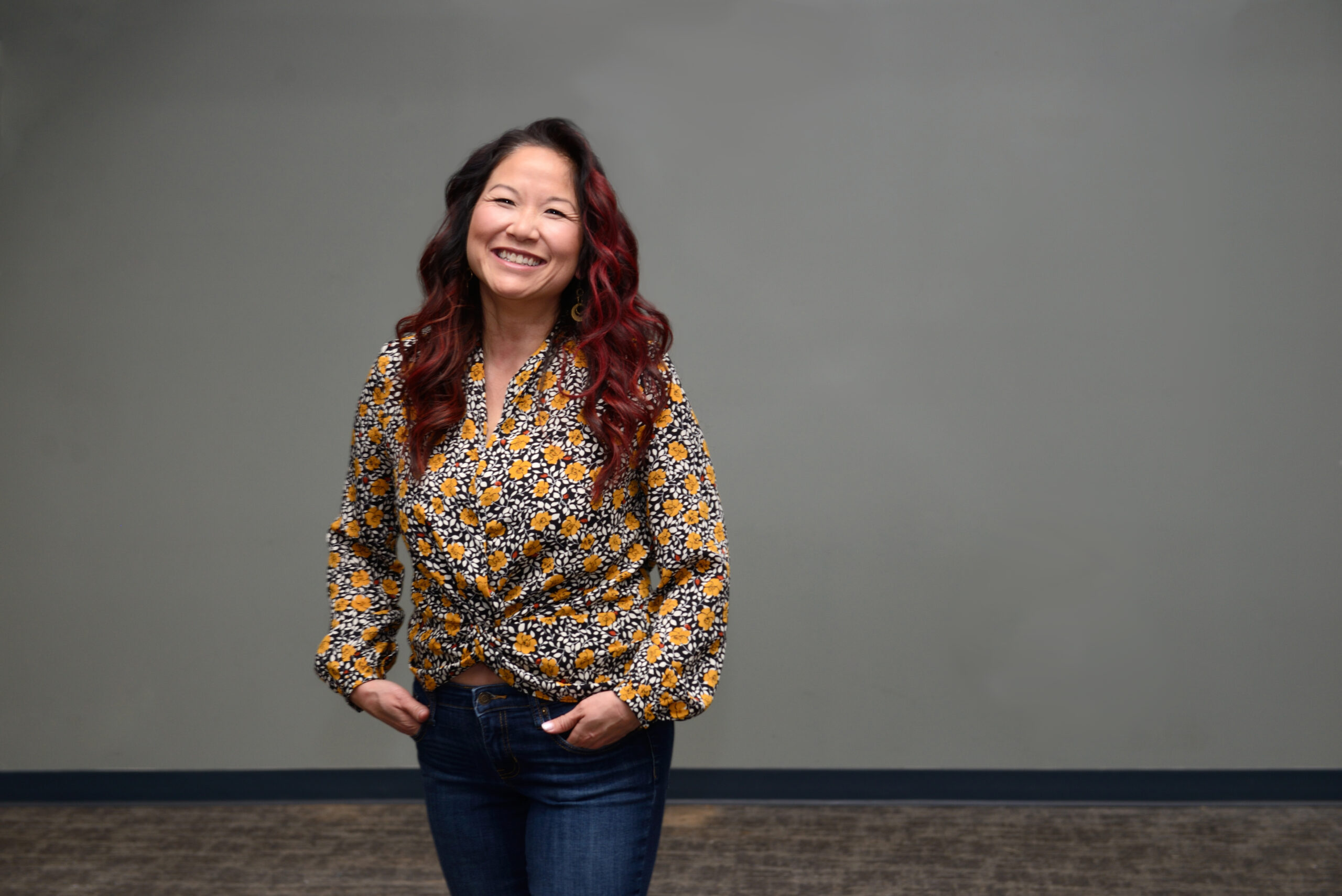
I love that. And for anyone that wants to know more about your world, Linh, I know that you have a book that is going to be coming out.
Yes. Oh, and to that another luck pusher thing that happened. So, I had finished all these adventures and then I lost someone that I loved dearly. So, I was plunged into this grief for a few years. And in that grief, I couldn’t work. I couldn’t show up at the college and deliver to – in front of a classroom the way I used to.
So, and that was when I found out about these grants, this Canada Council for the Arts, and my friend said, well, I’m a painter or I’m an artist and I’ve managed to get these Canada Council grants. So, you should apply. So long story short, I won three writing grants, federally and provincially. And that was what paid my bills in my grief so that I could sit at home. During COVID, to write my memoir. And that’s, and my memoir is called Luck Pusher.
Oh my gosh, your entire life, everything that I’ve been listening to, is predicated off of being an example of that over and over and over again. It has been such a pleasure to talk to you, my dear lady.
Is the book out? Is it coming out? Where can people learn more about that? Because I feel that for those that want to learn more of an indelible deeper understanding of your journey and how they can glean from it for their own lives. I feel the book is going to be an important part of the process.
Yeah, and it was such an important part of my life to capture all my life lessons in a, but writing it was a challenge. It is what I call the rough final draft currently. So we’re working with some editors and then we’re going to start looking for a publisher. So hey, if anyone is listening and they’d like to help and they have connections in that world, please reach out. The easiest way to find me is my website, which is luckpusher.com. Or on any of my social media, just search for @luckpusher and you’ll find me.
Oh, my gosh, you are such a pleasure. Are there any final words that you would like to leave everyone with before we close off, Linh?
Wonderlust is again, the mindset of approaching uncertainty with curiosity instead of fear. So anytime something comes up for you that’s uncertain, I don’t know what to do. I’m like, well, I don’ know what do. Here’s my most powerful closing.
Do not ask yourself, can I do it? Because the answers are, there’s two answers to that question. Can I do what the answer is yes or no. Do not ask yourself, can I do this? Ask yourself, how can I this? And it’ll shift your mindset. I didn’t like, can do the deserts? No, no, no. How can I the desert? Where can I access funding? How can train? What expertise can I?
So, in closing, do not ask if, can you do something? Change the question from ‘can I do it’ to ‘how can do it’? And it’ll shift your mindset.
Do not ask yourself, can I do this? Ask yourself, how can I do this? It will shift your mindset.
~ Linh Huynh
And if you want to know a little bit more about this whole concept, Rethinking Limits is a TEDx talk that Linh has done. I want you to go check it out, it is incredible.
Is there somewhere that people can sign up on your website to get on your mailing list when this book is out, when you are doing another talk somewhere.
Yeah, yeah, so luckpusher.com. It’s actually directed to, the main website is called sparkingwonder.ca and it just captures that curiosity mindset and you know, there’s whimsy and audacity to it, so.
I love it. Thank you so much.
Thank you so much. Thank you.
You’re absolutely a dynamo. Your spirit, I’m listening to you and like your spirit is like an ancient warrior trekking on because there’s no other option and that there are so many opportunities like the world is full of opportunities and I feel that you have manifested the life that you truly desire.
You have thought, you’ve put thought into action. And the universe has spoken for you. Like there are all of these times when money has shown up for you because you knew that you wanted to do something. I feel that’s a huge takeaway from today’s conversation.
Yeah, we could go into part two, really, just the untapped potential of our ability to manifest things. And people think it’s hokey and it’s not science-based and like well I can provide over a dozen examples of a time where I’ve actually just asked the universe ‘okay universe send me a contest’ because how else this a runner who comes last get sponsored to do these events. Tell me when do you know who the last person in the Olympics was in the 100-meter dash? No, nobody does. We only know who won the gold medal and the silver and the bronze but tell me how a runner who comes last keeps being supported.
Because you still got there. And the first, the second, the third place is all marketing, it’s all business. It’s not about winning, because you’re winning if you get there.
You’re winning if you finish, yeah. And I say, in the desert, we all got the same medal. Same medal.
Linh, you are a woman to admire. I encourage everybody to go hang out with you on your socials, to sign up on your website and to go watch your TEDx because you truly have inspired me.
Like we sit on the fence with a lot of things in life and we think we’ll get there or maybe we won’t. And when we say that we’re going to get there usually is because there’s something holding us back from doing it today.
So what’s holding you back?
Absolutely.
Like, don’t ask yourself, can I do it? It’s the wrong answer. It’s a wrong question. Ask yourself, how can I do it?
Absolutely. That’s when you become a luck pusher. Thank you so much. Thank you so much, Linh. I appreciate you and I encourage everyone to go hang out with you.
And I will see everyone next time with another insightful episode, just like this one. Transform Your Confidence, the podcast folks, you can go hangout with us on YouTube at The Open Chest Confidence Academy. You can also go to The OpenChestConfidenceAcademy.com to sign up for our freebies, our free newsletter. Be a part of our community.
Go to our socials @theOpenChestConfidenceAcademy, we are everywhere, and give us a five-star rating for today’s episode. If what we do here in our world just helps you up that next rung of ladder we’d really love to get the love from you, to get support from you.
And please share with everyone that you know, that you feel the need to know what we talked about today that’s going to help them elevate their mindset. Tell them to come and check out this episode, share it on your feeds, send it via an email, send it to people in your WhatsApp groups, and please stay connected with us.
I cannot wait to be hanging out with you again, and please go hang out with our fabulous Linh. I’ll see you next time.



